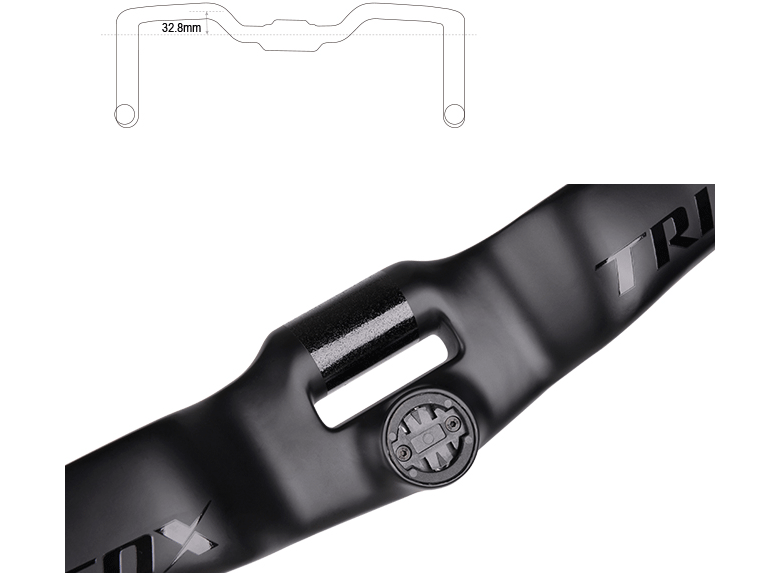
If you're looking to improve your biking speed and performance, you may want to consider investing in an aero bar. Aero bars, also known as tri bars or time trial bars, can help you achieve a more aerodynamic position on your bike, reducing wind resistance and allowing you to go faster with less effort. The Trifox 31.8 Drop aero Bar TC20UL is a handlebar made of carbon fiber and features internal cable routing, giving it a sleek, low-profile design. The unique shape of this aero drop bar includes a sink in the middle, which helps to change the riding posture and improve your long-distance riding experience. Additionally, the end of the handlebars lift up slightly, allowing you to ride with your forearms parallel to the ground, further reducing wind resistance. One of the best things about the Trifox aero bar is its versatility. It's perfect for riders who enjoy road, gravel, and cyclocross riding, as there are a variety of hand positions available with this compact, ergonomic design. With the Trifox 31.8 Drop aero Bar TC20UL, you can position your hands for optimal comfort and control, allowing you to focus on your performance without distraction. Not only is the Trifox aero bar functional, but it also looks great. The sleek carbon fiber finish and smooth contours of this aero drop bar add a touch of style to any bike. The AERO break wind design streamlines the shape even more, making it a visually striking addition to your ride. Plus, it comes with a stopwatch bracket, so you can keep track of your time and performance with ease. Another key feature of the Trifox aero bar is its ease of installation. It has a 31.8mm clamp diameter and doesn't require a stem, making it easy to add to your bike without any major modifications. Plus, the internal cable routing ensures that the cable setup is neat and tidy, reducing the potential for any tangled wires or snags. All in all, the Trifox 31.8 Drop aero Bar TC20UL is an exceptional aero drop bar that can help maximize your aerodynamics and improve your biking performance. Made of high-quality carbon fiber, it's both strong and lightweight, making it an excellent choice for a variety of riders. With its ergonomic design, versatility, and sleek appearance, it's a top contender on the market and definitely worth considering for anyone looking to take their biking performance to the next level.
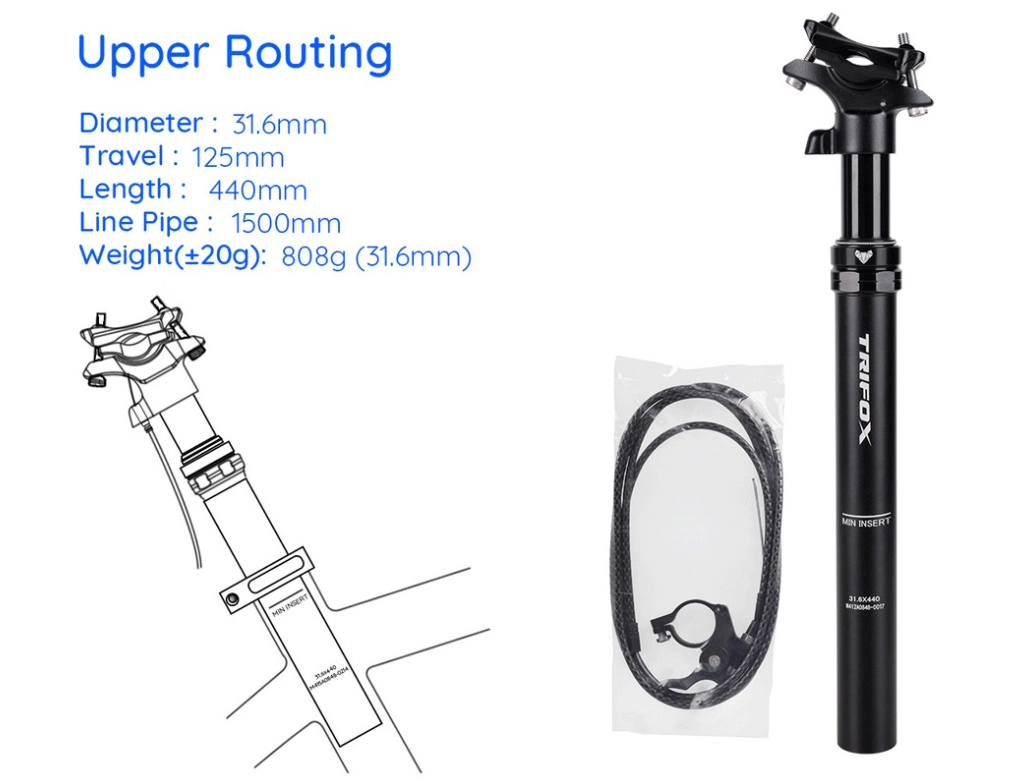
Mountain biking is a thrilling adventure sport that provides incredible experiences and challenges. However, as much as people love mountain biking, it can also be one of the most intimidating sports to participate in, especially for newbies. Mountain biking requires not only great control and skill but also the right equipment. In this blog post, we will be diving deep into why you should invest in a dropper post for mountain bike, and why the Trifox AIR Bike Dropper Seatpost AP316 is the perfect option for any avid mountain biker. 1. What is a dropper post and why do you need it? A dropper post, simply put, is a seat post that can be lowered or raised with the touch of a button or lever. This feature allows riders to adjust the seat’s height based on the terrain of the trail. Lowering the seat post gives riders more room and freedom for movement and control, especially on technical descents. Dropping your seat lower to the frame will transfer more weight to the back tire, giving you more traction and control. When the terrain flattens or inclines, a quick push of the button re-raises the saddle and is ready for pedaling. 2. Features of Trifox AIR Bike Dropper Seatpost AP316: The Trifox AIR Bike Dropper Seatpost AP316 is a premium-quality dropper that is lightweight, durable, has a smooth action, and is easy to install. The seat post is made of AL7075 aluminum alloy, making it durable and strong, yet lightweight. It comes in a length of 440mm with an O.D of 31.6mm, making it perfect for pipe diameter of 31.6. Trifox also offers three different wiring options i.e, Upper Routing, Center Routing, and Bottom Routing. The finish of the seatpost is an attractive UD matte, giving your bike a sleek look that will turn heads in the park or on the trail. 3. Benefits of Using Trifox AIR Bike Dropper Seatpost AP316: The Trifox AIR Bike Dropper Seatpost AP316 has many benefits and will be the perfect addition to your mountain bike gear setup. The first is that it has a 125mm travel, meaning that it is perfect for reducing the strain on your legs when you're going on a technical descent. This also ensures that you maintain your speed even in the steepest, most technical parts of the trail. The second is that the seat post is easy to install and ships with everything you need to get started. Lastly, it is made of high quality and durable materials, which makes it perfect for those riders who want to push their limits when it comes to mountain biking. 4. Making the decision to invest in a dropper post: Investing in a dropper post is a smart decision for those who are serious about mountain biking. A dropper post will allow you more control and freedom when it comes to navigating terrain. It prevents pain and strain in your lower back and thighs, thus allowing you to ride for longer without feeling fatigued. A dropper post is also a great addition for those who are looking to take part in longer rides and races. Conclusion: In conclusion, investing in a quality dropper post is a must for any serious mountain biker. The Trifox AIR Bike Dropper Seatpost AP316 is an excellent option, providing you with unmatched control and maneuverability on the trails. The seat post is an investment that will pay off immediately, reducing rider fatigue and increasing rider speed and control in technical sections. Get your hands on a Trifox AIR Bike Dropper Seatpost AP316 today and get ready for amazing experiences on the trails!
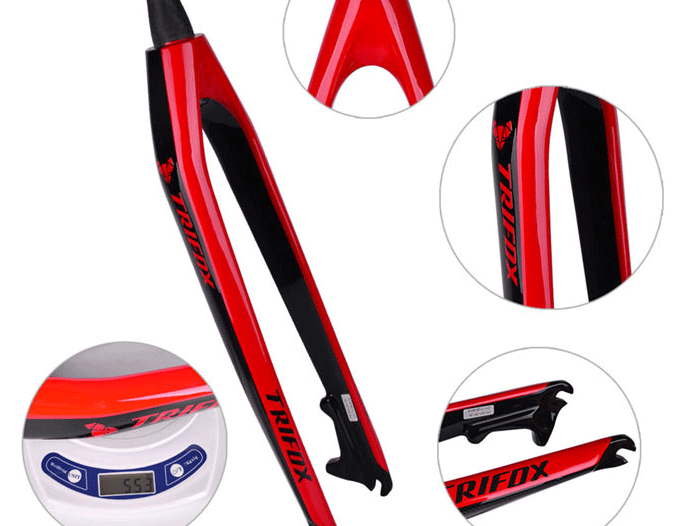
Are you looking for an upgrade to your bike that can take its performance to the next level? If yes, then Trifox has got your back with their 29er bicycle carbon fork QMK100. This fork is known for its excellent performance, lightweight construction, and remarkable durability. In this blog post, we will discuss why you must consider buying this fork for your MTB and how it can enhance your biking experience. 1. Improve the handling of your bike The Trifox 29er bicycle carbon fork QMK100 is designed to enhance the handling and control of your bike on the trails. This fork is very lightweight, which means it reduces the overall weight of your bike, making it easier to handle. Plus, the tapered style and quick release dropout make for easier steering. So if you've been experiencing difficulty in steering your bike or want a more comfortable ride, the Trifox 29er Carbon MTB Fork Rigid QMK100 is the perfect upgrade. 2. Enjoy a smoother ride If you frequently ride on rough terrain, you might experience a lot of shaking and vibration in the handlebar. Fortunately, this fork features a carbon construction that reduces the amount of vibration transmitted to the handlebar, reducing arm fatigue and providing you with a smooth ride. With this fork, you will hardly notice when you ride over bumps, rocks, or any other obstacles. 3. More responsive braking experience The Trifox 29er Carbon MTB Fork Rigid QMK100 comes with disc brake compatibility, which offers a more responsive braking experience. Disc brakes are more powerful and predictable, and they offer better modulation, so you can stop your bike without any difficulty. This feature is particularly beneficial when you are riding in muddy or wet conditions, or if you want to brake quickly when speed is a problem. 4. Long-lasting durability One of the most significant advantages of the Trifox 29er bicycle carbon fork QMK100 is its long-lasting durability. Made from high-quality T800 Import Carbon, this fork is resistant to wear, corrosion, and damage, ensuring you get a long-lasting return on your investment. Additionally, it employs a glossy finish that not only looks great but also increases durability by making the fork scratch-resistant. 5. Look stylish Lastly, we can’t forget to mention that the Trifox 29er Carbon MTB Fork Rigid QMK100 is available in two distinctive colors, red and black, that not only make your bike look good but also improve its visibility. You can choose the color that suits your style and match it with your other bike components. Apart from enhancing its appearance, these colors make your bike stand out, which means it is easier for cars and other bikers to see you on the road. Conclusion: Overall, the Trifox 29er Carbon MTB Fork Rigid QMK100 is an excellent upgrade for any MTB rider looking to enhance their biking experience. With better handling, smoother ride, disc brake compatibility, long-lasting durability, and stylish appearance, you won't regret investing in this fork. Whether you are a casual biker or a seasoned professional, the Trifox 29er Carbon MTB Fork Rigid QMK100 is an upgrade worth considering. So what are you waiting for? Get your hands on this fork and take your biking experience to infinity and beyond!

Are you looking to upgrade your bike's handlebars for better control and a sleeker look? The Drop Cycle Handlebars DHB500 may be just what you need. This 28.6mm Carbon Integrated Drop Bar is a one-piece carbon bar/stem combo that brings clean looks and light weight to any Road bike or Mountain Bike. 1. Improved Control: With the Drop Cycle Handlebars DHB500, you'll enjoy improved handling and control, thanks to its lightweight T800 Full Carbon construction. This not only offers a great road feel but also ensures better steering precision and responsiveness. The calibration marks and flat front surface make for easy lever installation, saving you time and hassle. 2. Wind-Resistance: The high-temperature joint-treated corners provide additional durability and longevity to the handlebars. The Drop Cycle Handlebars DHB500 also features an internally routed design that helps reduce wind resistance while riding. This means you'll experience less drag and greater speed, letting you easily tackle those challenging mountain climbs or race down the long stretches of road. 3. Ergonomic Design: The Carbon Drop Bar DHB500 boasts a sleek and ergonomic design that is both functional and stylish. It is available in various widths to ensure a perfect fit for your unique riding style and preferences. Furthermore, the integrated stem and bar combo add to the aesthetics of your bike, creating a seamless look that will turn heads and be the envy of your cycling group. 4. Durability: Drop Cycle Handlebars DHB500 are built strong and sturdy, thanks to the use of T800 Full Carbon construction. This means it can withstand the impact of any obstacle or accident while keeping your hands safe. The handlebars have also been tested for impact resistance, providing you with peace of mind knowing that your investment is a wise one that will last for the long haul. 5. Versatility: Whether you are a road biker or a Mountain Biker, the Drop Cycle Handlebars DHB500 is a versatile addition to your bike. With clamp diameter 28.6mm and bar width (center-to-center): 400mm/420/440mm, you can choose the size that fits the requirements of your bike and ensures optimal performance. In summary, the Drop Cycle Handlebars DHB500 have many benefits that make them a must-have upgrade for any cyclist. From increased control, wind resistance, and ergonomic design to their durability and versatility, they provide a superior riding experience that is unmatched by any other handlebars on the market. So, if you are looking for a game-changer that will take your cycling to the next level, look no further than Drop Cycle Handlebars DHB500.
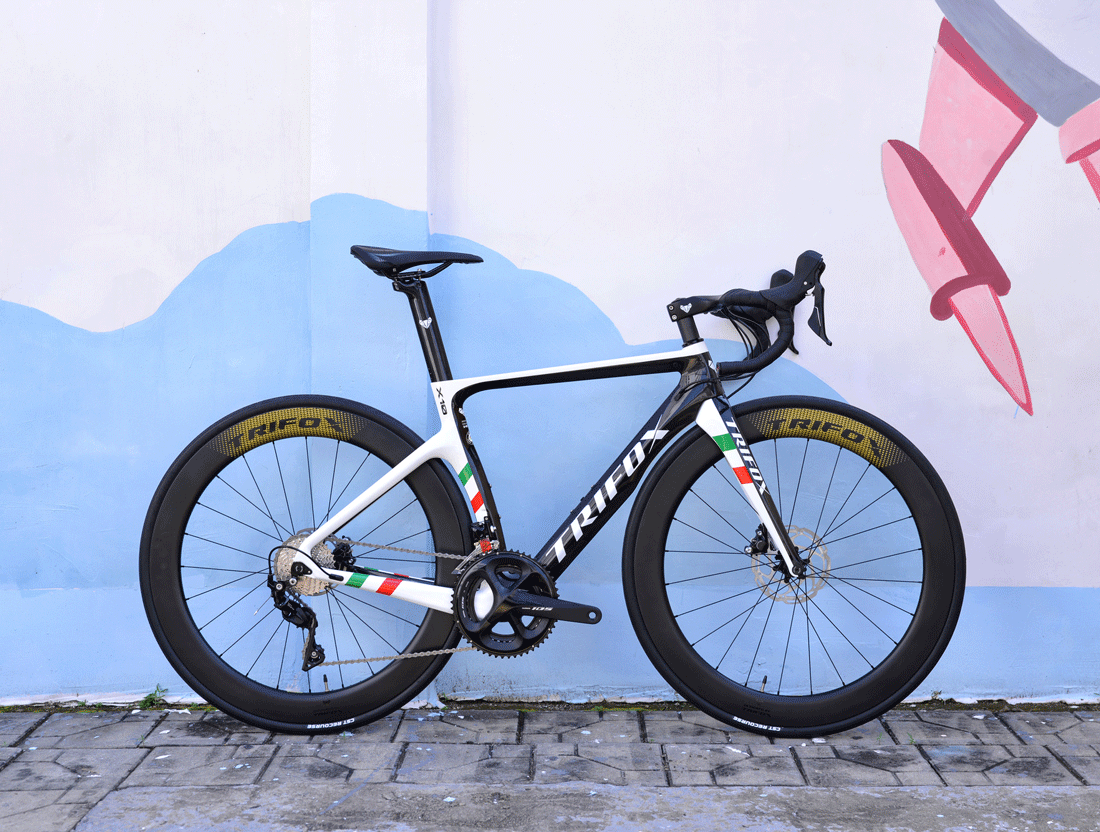
As we all know, carbon fiber is a popular material used in crafting bike frames as it is durable, lightweight, and offers excellent performance. However, these features come at a cost, and most carbon fiber frames are expensive, which can be discouraging, especially for those on a budget. Fortunately, you can still enjoy the benefits of carbon fiber frames without breaking the bank. In this blog post, we'll highlight the best budget carbon fiber road bike frames available in the market, specifically Trifoxbike's five road framesets. 1. Carbon Aerodynamic Bicycle Frame X8QR and X8TA For riders after a high-performance and stylish road bike frame, the Carbon Aerodynamic Bicycle Frame X8TA and X8QR from Trifoxbike is an excellent choice. These frames are crafted from lightweight and durable T800 carbon fiber, making them sturdy and aerodynamic. They come with V brake frames and are compatible with component sizes, ensuring optimal performance regardless of your preferred drivetrain setup. 2. Carbon Fiber Frame Road Bicycle X10 The X10 carbon fiber bicycle frame is Trifoxbike's new addition and highly compatible with both DI2 and mechanical systems. This compatibility ensures you experience optimal performance regardless of your preferred drivetrain setup. The X10 also comes with a seat post, front derailleur hook, hanger, and a headset, making it convenient and effortless to set up your dream bike. 3. Carbon Lightweight Bicycle Frameset X12 If you're after an aero road frameset that provides comfort and personalized fit, Trifoxbike's Carbon Lightweight Bicycle Frameset X12 is a great option. This frameset is available in various sizes to accommodate different rider heights and inseams, ensuring a perfect fit for maximum performance. 4. Super Light Carbon Cycle Frame X16 For those looking for the lightest road bike frames, the X16TA and X16QR from Trifoxbike come highly recommended. The X16TA has a Front: 100mm*12mm and Rear: 142mm*12mm compatibility with component sizes, while the X16QR has a Front: φ9x100 mm and Rear: φ10x130 mm. Both frames are crafted from super light carbon fiber and come with a seat post and headset, making them perfect for those who require optimal performance at a reduced weight. 5. Carbon Road Bike Frame X18 Lastly, Trifoxbike's Carbon Road Bike Frame X18 is perfect for cycling enthusiasts and professional riders. This frameset allows compatibility with component sizes, including the Full Internal Cable Routing Bike Frameset X18, which accommodates up to 700c wheels, with tire widths ranging from 28mm. The braking system is a Disc Brake (clipper holder: Flat Mount), Thru Axle Dropout, ensuring maximum safety while on the road. Conclusion: Finding a budget-friendly carbon fiber road bike frame can be challenging. Still, Trifoxbike's five road framesets are a testament that you don't have to break the bank to enjoy the benefits of carbon fiber frames. They are all crafted from high-performance and durable materials, ensuring optimal performance for every rider. Take your cycling experience to the next level with Trifoxbike's affordable excellence.
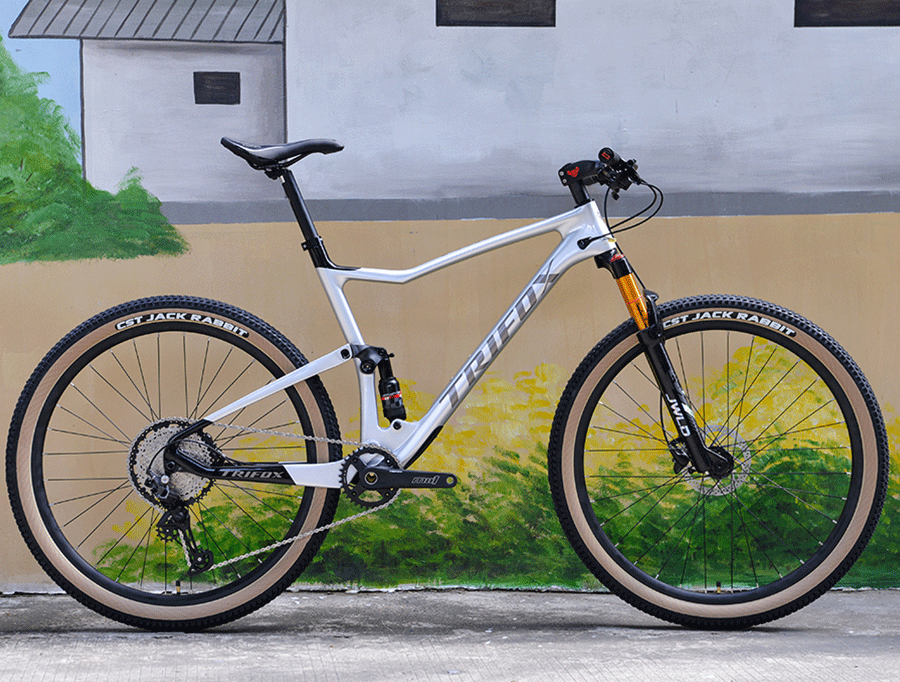
Mountain biking has always been an exciting and challenging sport that requires top-of-the-line gear to keep up with its demands. Choosing the right MTB frame can be daunting, but Trifoxbike might just have the solution you need. Their lineup of MTB frames includes a wide variety of choices, each designed to deliver exceptional performance and durability. In this blog post, we'll take a closer look at their products and help you choose the best Chinese MTB frame that suits your needs. Carbon fiber full suspension mountain bike frame MFM100 The MFM100 is a top-of-the-line carbon fiber full suspension frame that's designed for off-road enthusiasts seeking exceptional performance and durability. It features a high modulus carbon fiber construction that makes it lightweight while maintaining a sturdy and reliable build. Its rear suspension delivers around 100mm of travel, giving you the comfort you need on rough terrains while maintaining good pedaling efficiency. The frame is compatible with a boost 148 rear hub and a fork with 110mm boost spacing. Carbon hardtail bike frame SDY20 If you're looking for a lightweight and performance-oriented bike frame, the SDY20 might just be the perfect choice for you. The frame weighs only 980g (S-15'') and 1050g (M-17''), making it one of the lightest frames available in its class. Its geometry is specifically designed to boost your confidence on any terrain, giving you the agility and responsiveness you need to tackle challenging tracks. The frame is compatible with a Boost 12*148 rear hub and a 100mm suspension fork. Carbon 29er mountain bike frame SDY21 The SDY21 is a 29er carbon fiber hardtail frame that offers both durability and flexibility. Its carefully crafted geometry accommodates 29er*2.1" wheels, giving you the confidence to tackle rough terrains. The frame is designed to swap between Quick Release and Thru-Axle (135QR, 142TA, 148 boost), giving you more versatility when it comes to choosing your wheelset and giving you better control on the trail. Carbon fiber 29er frame MFM200 The MFM200 is another 29er carbon fiber hardtail frame that's designed to give your bike an edge on the trails. Its sleek design accommodates 29er*2.1" wheels, delivering the agility and versatility you need to conquer any terrain. With a weight of 1050g (M size), this frame is one of the lightest available, making it a great choice for riders who are looking to have an agile and nimble feel on their bike. The frame is compatible with a Boost 12*148 rear hub and a 100mm suspension fork. Conclusion: Choosing the best Chinese MTB frame can be a daunting process, but Trifoxbike's lineup of frames offers a wide range of choices that deliver exceptional performance and durability. If you're looking for a full suspension frame, the MFM100 is a great option that offers around 100mm of travel, making it ideal for more demanding terrains. On the other hand, if you're looking for a lightweight hardtail frame, the SDY20 and MFM200 both deliver exceptional performance, with the SDY20 being one of the lightest hardtail frames available. Finally, if you're looking for versatility, the SDY21 can be swapped between Quick Release and Thru-Axle, giving you more options when it comes to choosing your wheelset. Whatever your needs might be, Trifoxbike has a frame that'll fit you perfectly.
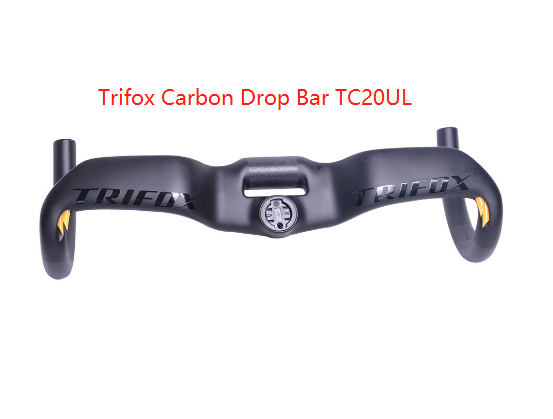
For avid cyclists, every component of their bike plays a crucial role in their cycling experience. From the frame to the wheels, every piece contributes to overall performance and comfort. One often overlooked feature, however, is the drop bar. Cyclists typically use traditional drop bars, which offer a limited range of hand positions, which can cause discomfort and pain during long rides. But with the advent of integrated drop bars, cycling has reached a new level of comfort and performance. In this blog post, we’ll delve into the details of integrated drop bars, their features and benefits and how they can revolutionize your cycling experience. Integrated drop bars are a relatively new innovation in cycling technology. They allow riders to switch between comfortable and aggressive positions without compromising on speed or aerodynamics. The carbon fiber aero drop bar C20UL, for instance, has a sleek and compact design that offers a variety of hand positions. This means you can shift your wrist angle or grip position as per how you feel at any given time, without having to slow down or stop. Integrated drop bars offer enhanced stability during both downhill rides and high-speed turns. This is because they allow the rider to feely adjust their position on the bike, which in turn enables better weight distribution. With traditional drop bars, riders are limited to one hand position, which can cause instability and discomfort. But with integrated drop bars, riders can seamlessly shift their grip positions and adjust their weight distribution, which results in greater stability and control. Integrated drop bars also come with advanced features that enhance your cycling experience, such as AERO break wind design and a stopwatch bracket. These features improve aerodynamics and help you to monitor your performance in real-time. The Uplift style of the TC20UL aero drop bar, for example, offers unparalleled aerodynamics, which reduces wind resistance and enhances speed. When it comes to aesthetics, integrated drop bars are unrivaled. Thanks to their sleek carbon fiber finish and smooth contours, these drop bars not only perform exceptionally well but they also look great. Frankly speaking, the integrated drop bars are a statement of class and style. In conclusion, integrated drop bars are a game-changer in cycling technology. They offer a range of hand positions, enhance stability and control, improve aerodynamics, and look great on the bike. If you’re an avid cyclist, you need to try out integrated drop bars and experience the difference they make. Visit a local bike shop, and you'll be amazed at the variety of styles and options on offer. Integrated drop bars are the future of cycling, and you don't want to be left behind. So get one and revolutionize your cycling experience today!

Riding a bike, no matter the type, can be an incredibly liberating and exhilarating experience. However, if you're not equipped with the right bike handlebars, you can quickly find yourself losing control of the bike, especially when you're pushing the bike to its limits. Fortunately, Trifox Bicycle bars offer exceptional control and handling, giving you the peace of mind and confidence you need to tackle any situation. At Trifox, we offer a broad range of handlebars suitable for any biking style, including road, mountain, and track. One of our most popular handlebars is the Trifox Carbon Fiber Road Handlebar. We've designed this handlebar to provide superior control and handling, mounted in an ergonomic shape that will keep your hands feeling comfortable on long and demanding rides. The handlebar is made using the highest quality carbon fiber material, making it lightweight and strong so that you can handle any trail you take on. When you're looking for exceptional control and handling, the Trifox Carbon Fiber Mountain Bike Handlebar is the perfect solution. Whether you're a beginner or an experienced rider, this handlebar offers the durability, strength, and stiffness you need to tackle any challenge. The handlebar features an ergonomic design that is easy to maneuver in all conditions, giving you complete control over the bike's performance. As with all Trifox Bicycle bars, the carbon fiber material used in this handlebar is lightweight, making it easy for you to handle rough terrains and long rides. Trifox Bicycle bars are also perfect for those who love racing on the track. Our Trifox Aero Carbon Fiber Track Handlebar offers precision craftsmanship, with a design that is both aerodynamic and visually striking. The handlebar is available in a variety of sizes, so you can choose the best size for your biking style and body type. With Trifox Bicycle bars, you won't have to worry about any discomfort or impediments while racing; you can focus on your performance and winning the race. If you're someone who likes to customize their bike, we also have a range of handlebars that allow you to customize your biking experience. For example, the Trifox Carbon Fiber Integrated Road Handlebar and Stem combinator offers superior stiffness and handling, along with an integrated stem that allows you to reduce the overall weight of your bike. Additionally, our Trifox Carbon Fiber Flat Handlebar offers a unique combination of comfort and style, with a flat design that's ideal for riding in urban areas. Conclusion: Whether you're a seasoned pro or just starting, Trifox Bicycle Bars offer unmatched control, durability, and handling. As world leaders in handlebar design and manufacture, Trifox continues to provide bikers with the ultimate biking experience. No matter where you're riding or what style of biking you enjoy, Trifox Bicycle Bars offer the perfect combination of functionality, style, and performance. So, if you're serious about biking, consider making the switch to Trifox Bicycle Bars and experience the ultimate biking control like never before!
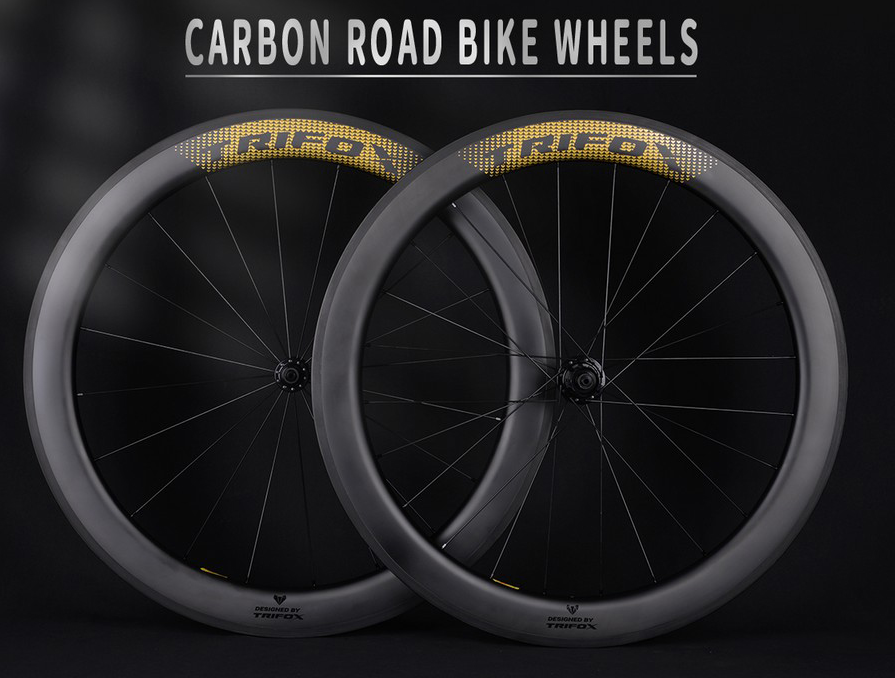
Bike wheels are one of the most crucial components of any bicycle. In fact, your bike wheels will affect your overall riding experience more than any other component. As such, it's essential to choose the perfect set of carbon wheels for your bike. In this blog post, we'll dive into the world-renowned Trifox Carbon Wheel Set. 1. Lightweight and Durable Build The Trifox Carbon Wheel Set is designed with a lightweight carbon fiber that gives the wheels a remarkable weight-to-strength ratio. The lightweight build reduces the overall weight of your bike, which translates to a more effortless ride. Additionally, the carbon fiber material used to develop these wheels offers maximum durability, ensuring that the wheels can withstand even the toughest road conditions. Their durability means that you can confidently use your Trifox Carbon Wheel Set on any terrain without worrying about wear and tear. 2. Enhanced Aerodynamics Design The Trifox Carbon Wheel Set is specially crafted with aerodynamics in mind. With the unique design, these wheels offer a significantly lower drag coefficient than other conventional wheels. This feature provides a faster and smoother ride, especially when cycling at high speeds. The aerodynamics of the wheels have been tested in wind tunnels, confirming Trifox's commitment to delivering top industry performance. 3. Improved Braking and Stability Trifox integrates a unique braking surface, making the Trifox Carbon Wheel Set one of the best when it comes to braking performance. This feature means that the rider has more control and stopping power, reducing the possibility of accidents. Additionally, the wheels feature a unique rim profile that grants maximum stability, ensuring that the rider feels safe even when navigating tricky terrain. 4. Wide Range of Options Trifox offers a wide range of options for the Trifox Carbon Wheel Set, making them perfect for bikers with different needs. The wheels come in various sizes, allowing you to choose the perfect set of wheels that fit your bike. With rim depths ranging from 38mm to 86mm and options to choose between disc or rim brakes, you can find a Trifox Carbon Wheel Set that meets your cycling needs. Conclusion: In conclusion, the Trifox Carbon Wheel Set is undoubtedly a set of wheels that you should consider if you're looking to enhance your bike's overall performance. With their lightweight build, enhanced aerodynamics design, versatility on all terrains, improved braking and stability, and vast range of options, Trifox Carbon Wheel Set is an excellent investment for amateur and professional cyclists looking for the best performance. Don't wait any longer to improve your cycling experience; get yourself a Trifox Carbon Wheel Set today.

















